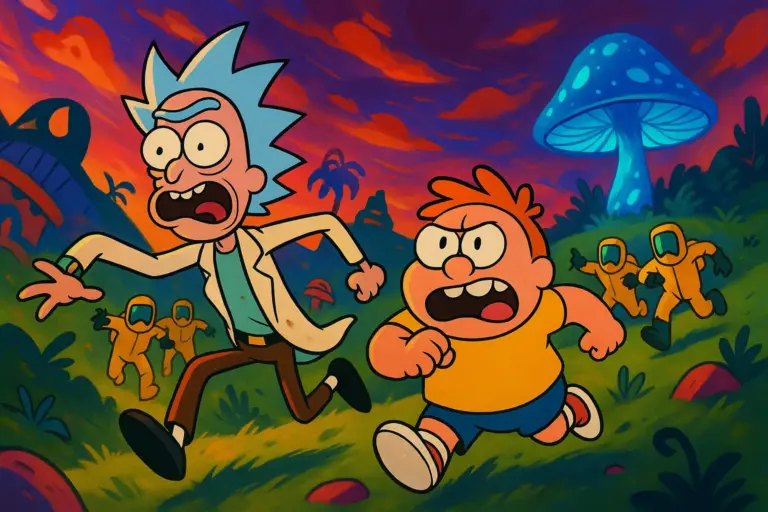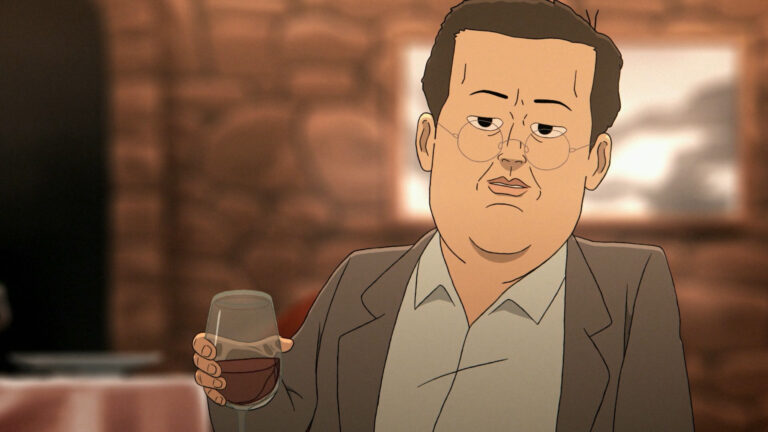Step aside, simple cartoon hijinks — Common Side Effects (CSE) brings a rush of what-the-actual-medicine ethical puzzles that sneak up on you between all the neon trip montages and nosey shrooms. If you ever thought “hard choices” in animation meant picking between a kitten or a pizza, oh, you have no idea what’s bubbling beneath the surface of this series. The creators, Joe Bennett and Steve Hely, take us on a spiral through the medical-industrial complex, slinging wild rainbows of humor, but always steering us straight into very real moral quagmires.

When Betrayal Looks Like a Promotion: Frances and The Mentor Meltdown
Let’s start with Frances Applewhite — queen of the frazzled, hopeful, secretly rebellious executive assistants everywhere. In the CSE universe, Frances keeps her head down at Reutical Pharmaceuticals, mostly following orders, fetching coffee, and navigating Rick’s wild mood swings. But things go off the rails fast when the wondrous Blue Angel mushroom flops into her lap. This isn’t just some magical MacGuffin; it’s a potential cure for, well, everything that ails you — including her mom’s memory loss.
Here comes the gut punch: Instead of doing what feels morally “right” and keeping the mushroom away from corporate greed, Frances snatches personal gain. She hands it over to her boss, Rick, hoping for that long-overdue leg up. Who wouldn’t want to finally escape the bottom rung? But of course, the second she makes that trade, the consequences ripple out. Marshall gets picked up by the feds, the company goes full Bond-villain, and Frances has to live with the fact that she just sold out a friend for a paycheck.
And just because Frances makes a single desperate move doesn’t mean the fallout gets tied up neatly. No, instead:
- The Blue Angel mushroom falls squarely into Reutical’s profit-driven hands.
- Marshall becomes a fugitive.
- Frances gets a front-row seat to corporate exploitation — and her own inner guilt parade.
Every choice Frances makes is tinged with all-too-relatable pressure: bills, family, fear, and the whisper that maybe this time she deserves a win. It’s one thing to know what’s right; it’s another thing to act on it when you’re dangling by a thread.
Marshall the Mycelial Maverick: Outlaw With a First-Aid Kit
Meanwhile, Marshall Cuso practically lives in his own indie-filmmaker fever dream. If you think “mushroom scientist” means gentle spore observations by moonlight — think again. Marshall goes from quirky mycologist to outlaw healer faster than you can say, “Schedule I substance.” The healing magic of Blue Angel lands in his hands, and immediately, he knows Reutical can’t be trusted with it. Instead of looping it into the official channels, he kicks the system to the curb and rolls up his sleeves.
And because no good deed goes unpunished, Marshall finds himself:
- Dodging the Drug Enforcement Administration.
- Surviving assassination attempts like he’s suddenly starring in a Jason Bourne flick.
- Slinking around, risking his career, freedom, and, let’s be real — his life.
Why break bad? Because the system, skewed as it is, leaves people like his partner, Frances’s mom, and honestly — most of us — in the lurch. Marshall’s methods get dicey, sure, but the impulse? It’s the Hippocratic Oath, with some hallucinogens and a middle finger.
Is he right to pull a Robin Hood with biochemicals? Or does he risk unravelling public trust, however flawed that trust may be? The show doesn’t hand us an answer gift-wrapped. It juggles the contradictions because, let’s face it, the grown-up world is a mess of gray areas, especially around medicine.
Psychedelia With a Purpose: Trippy World, Real Stakes
Sure, CSE looks bonkers. Talking fungi, sentient networks glimmering with trippy colors, and chase scenes set to psychedelic rock melodies? Sign us up! But here’s the genius: Everything flashy, animated, and weird operates in service of lighting up real-world debates. Bennett and Hely riff on actual problems embedded into our current medical and pharmaceutical systems. Big Pharma isn’t just a punchline; it’s the ever-present villain with ever-deepening pockets.
The show’s writers, inspired by headlines and horror stories from our own timeline, wield the fantastical like a scalpel. That trippy Blue Angel mushroom? Secret metaphor alert! It stands in for both the danger and the hope tangled up in game-changing medicine:
- Is it about healing, or hoarding wealth?
- Who gets access to miracle treatments, and who’s left behind?
- Is “saving lives” ever an excuse for bending the rules?
Instead of preaching, CSE throws the questions at the viewer, often literally, using mind-bending imagery and sparkling dialogue that makes big ideas stick.
The Mycelium Connection — Not Just Plant Stuff
Don’t let the biology jargon head-fake you — mycelium gets star billing for a reason. At first blush, it’s an underground network connecting mushrooms. But CSE stretches the metaphor until it pulses with life. Think of it as the internet for plants: invisible, vital, and endlessly complex. The show argues that humans could — and maybe should — learn from the mycelium model.
Our world, just like theirs, works best when everyone shares resources. But unlike mushrooms, humans hoard, gatekeep, and lock medicine behind patents. The ethical drama gets sharper because every major choice our heroes make either fractures or strengthens these fragile networks.
You can hear the writers winking whenever the script compares mycelium to the healthcare web that (ideally) links patients, doctors, and researchers. If only our own systems worked with half the generosity of fungi. But, as in most things, money, power, and fear get in the way.
Art That Hurts So Good: Animation With Nerve
On a technical level, CSE refuses to rest on its wild color palette. Scenes of medical miracles and betrayals pop with discomforting reality. The animation falters on purpose sometimes — shaky lines, melting backgrounds, split-second horror in a character’s eyes. This isn’t just style-for-style’s-sake; it’s a commitment to making viewers feel every moral ache.
When Frances betrays Marshall, the room doesn’t just darken — the whole visual atmosphere pivots into chaos. When Marshall risks his neck for a stranger, healing takes the shape of fireworks under the skin.
These choices make the ethical stakes punch through the screen. Even a quick gag about side effects wriggles with anxiety about hidden costs. You can almost smell the corporate deodorant in the Reutical boardrooms. You choke on the sterile air. Background details, like a news ticker or snatches of protest graffiti, hammer home the show’s relentless, uncomfortable questions.
How Choices Echo: Dominoes Down the Rabbit Hole
Every action in CSE carries weight — sometimes literally, as the plot snowballs dangerously. Frances’s half-panicked, half-calculated turncoating doesn’t just tank one friendship. It:
- Launches corporate espionage into a feeding frenzy.
- Sends Marshall careening into full-on rogue status.
- Traps her in a loyalty tug-of-war that feels almost physically painful to watch.
Meanwhile, Marshall’s decision to go rogue doesn’t just put himself on thin ice. It starts to inspire — and endanger — everyone around him. Friends question their own boundaries. Enemies ramp up the stakes. The entire city, warned and rattled, begins to watch, torn between hope for a miracle and suspicion of a snake oil scam.
Characters push and pull each other through cycles of trust and betrayal. Viewers don’t get a moral of the story, neat and easy. Instead, they’re left to ask: What would I do? Would I play it safe, or take the leap, risks and all? And what’s the price if you pick wrong?
The Ethics Always Lurk Beneath the Surface (With Teeth)
“Common Side Effects” may drape everything in technicolor chaos, but don’t let the cartoon sooth you. This series builds a sly tension, a pressure cooker underneath every psychedelic visual. Real-world stories fuel the fire: The cost of medicine, the giant gulf between what’s invented and what’s shared, and the tortuous twists ambition takes when health — or money — is on the line.
At its core, CSE passes the hardest test for a show about morality: It makes us feel not just the stakes for its characters, but the drag and snap of these decisions in our own world. Medical ethics, so often dry on paper, here ignite with humor, awkwardness, color, and pain.
Inhale, Exhale, and Check Your Moral Compass
So, next time you pop on an episode, maybe go in expecting laughs, but stay for the gut checks. CSE doesn’t just want to dazzle your eyes; it’s aiming straight for your ethical soft spots. Every fantastical moment is rooted in something raw and real. The show wants you to leave its universe tripped-out, sure — but maybe just a little bit better at asking, “What’s the right thing to do — especially when it hurts?”




